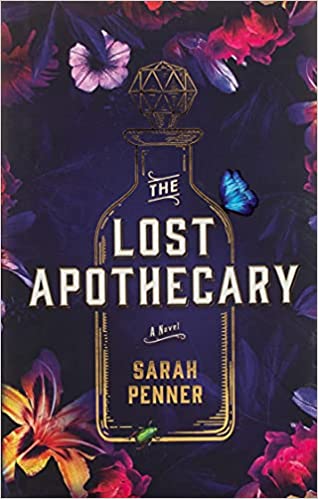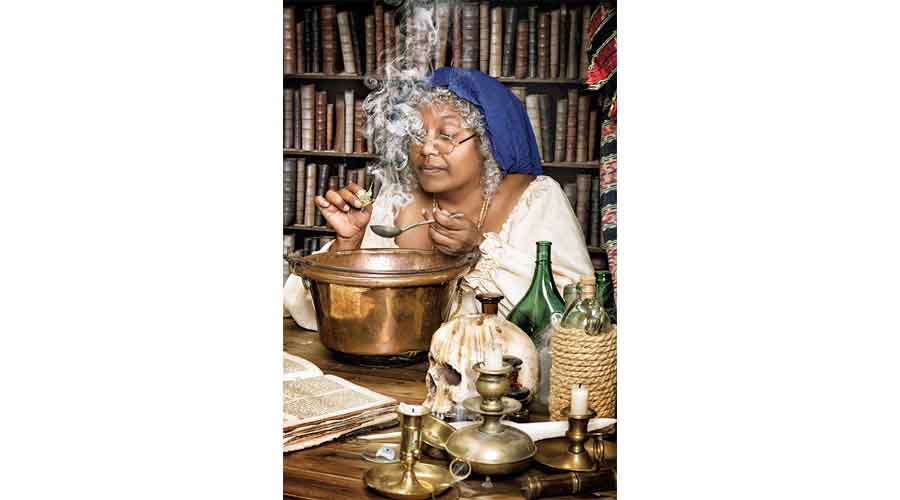Book: The lost apothecary
Author: Sarah Penner
Publisher, Price: Legend, Rs 599
The chance discovery of a small, blue glass vial with a strange image of a bear etched on its side during a mudlarking (scouring the riverbank for historical artefacts) trip by the Thames leads the amateur historian, Caroline Parcewell, to cross paths with Nella Clavinger, a mysterious apothecary who lived nearly 200 years ago. While this intriguing find inspires Caroline to trace the missing, yet plausible, link between Nella and the unsolved apothecary murders that caused a stir in 1790s London, she also struggles to come to terms with the sudden disclosure of her husband’s infidelity on the eve of her 10th wedding anniversary. As she gets closer to solving the mystery, Caroline feels a strange empathy for Nella, whose antique shop in a shadowy cul-de-sac off Fleet Street in 18th-century London had once allegedly doled out deadly tinctures and potions to women who had been betrayed by the men they had loved and trusted. In her debut novel, The Lost Apothecary, Sarah Penner crafts a meticulously researched and shockingly intoxicating piece of historical crime fiction that effortlessly juggles a double plotline set in two different timeframes and a trio of protagonists in a tale of poison, murder, revenge and unlikely friendship.
Within the narrative, Nella represents traces of a past that keeps on intersecting and, occasionally, overlapping with Caroline’s present. The latter’s effort to piece together the broken bits of her life and move on hinges on the progress she is able to make in deciphering the missing pieces in Nella’s story. What starts off as a momentary diversion taken half-heartedly to overcome the shock of a crumbling marriage becomes a process of self-discovery and emancipation. Penner shows the strangely entangled ways in which women participate in each other’s lives, mutually shaping and affecting perceptions and lived realities. This is most explicitly revealed in the apothecary’s register in which Nella notes down the names of her women clients, their male oppressors/victims and the poison administered, forming a silent yet powerful sisterhood resisting patriarchal abuse in the only way possible in late-18th-century London.

The lost apothecary by Sarah Penner, Legend, Rs 599 Amazon
Penner complicates the historical timeline by introducing the character of the precocious servant girl, Eliza Fanning, who is given the onerous task of procuring poison and administering it to her adulterous master at the behest of his wife, Lady Amwell. Her presence helps lighten the sense of gloomy foreboding that hangs thick over Nella’s wasted life and her dilapidated shop, although Eliza also imposes psychological and narrative closure by serving as Nella’s nemesis in an unexpected and startling twist in the tale. Since the narrative unfolds through the perspectives of Nella, Eliza and Caroline, the reader is made privy to certain crucial bits of information that Caroline discovers only at the conclusion of the plot or never at all. For instance, she is able to discern the crucial presence of Eliza in Nella’s life rather late in the narrative. Dual plots can be tricky to handle and although this strategy ensures that the reader’s understanding of the events and character motivations are more nuanced than Caroline’s, it comes at the cost of diluting the sense of suspense (save her narrow escape from near conviction on charges of culpable homicide) that might be felt in the quest to unravel the truth about the past since the sequence of events in Nella and Eliza’s life and the circumstances in which they unfolded have already been revealed in the 18th-century plot line. Penner tries to evade this problem by shifting between different timelines in alternate chapters and ending each with a cliffhanger that leaves the reader impatient to know more, a technique that can backfire since it may lead to readers skipping chapters to read just one particular timeline.
If the tale of the lost apothecary seems implausible in some places, it is more than compensated for by Penner’s skill in recreating the sights, sounds and smells of 18th-century London. Nella’s old shop filled with tin funnels, metal scales, gallipots, grinding stones and porcelain jars or her fascinating accounts of procuring and administering poisons continue to linger in memory long after the final page is turned.











